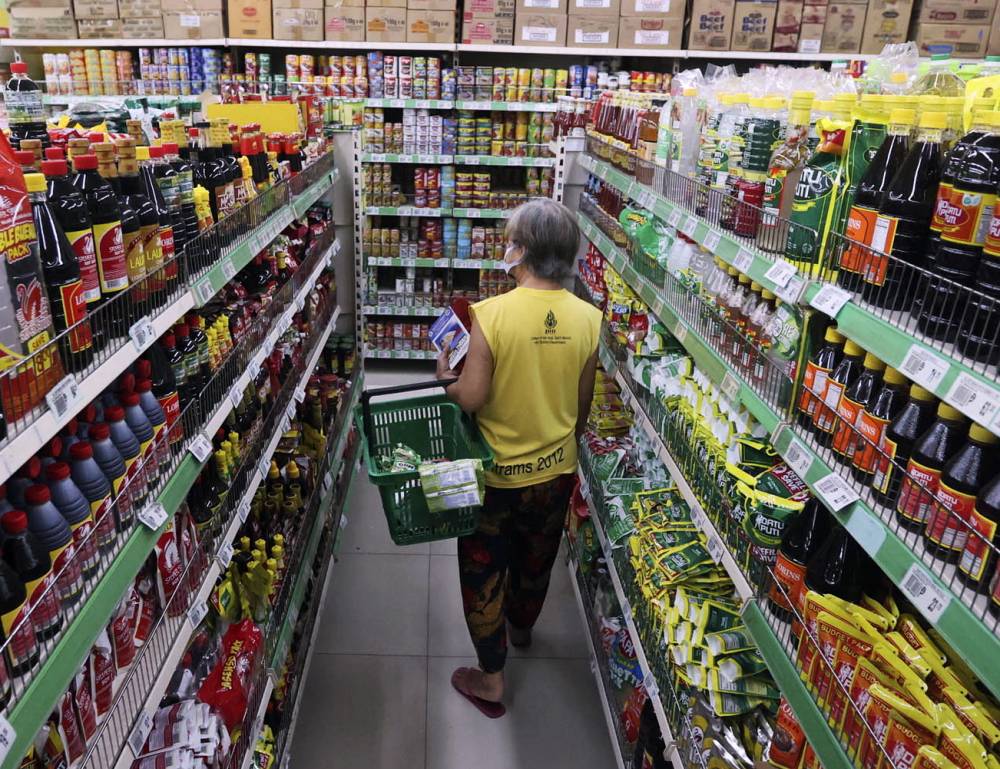
PRICE MONITORING – A shopper buys basic goods at a supermarket in Manila in this file photo taken in February of 2023. INQUIRER file photo / MARIANNE BERMUDEZ
MANILA, Philippines — The House of Representatives will check the reason for the high cost of basic commodities when farmers, manufacturers, and grocery stores have denied making significant price adjustments, Speaker Ferdinand Martin Romualdez and ACT-CIS party-list Rep. Erwin Tulfo said on Tuesday.
During a press briefing in Quezon City, Jayson Cainglet of Samahang Industriya ng Agrikultura (SINAG) and Elias Jose Inciong of the United Broiler Raisers’ Association, explained that there have been little movements in the farm gate prices of raw food products.
“At the farm level, the farm gate prices have been maintained for the past three months so Speaker, there should be no spike on the side of producers because the price of rice, poultry, pork, and even onions have been maintained for the past three months,” Cainglet said in a mix of English and Filipino.
“In the production side, on the side of producers, there is no increase in price. The harvest season is over, so it is on the hands of millers at traders, even the onions are in the cold storages already,” he added.
Inciong meanwhile said that farm gate prices for live chicken have been around P85 to P95 per kilogram, while retail prices go for P180 to P190 per kilogram. However, he said that the retail market is inelastic, which means that price changes at the farm gate sometimes do not immediately affect retail prices.
“Retail prices for over a year already have played between P180 to P190. Because retail is inelastic, that would not move immediately, sometimes even if the difference between farm gate and retail is at 100 percent, it still won’t move,” he noted.
Still, Cainglet believes the House can exercise its oversight functions to help farmers and retailers — and eventually, consumers — identify why prices are still rising despite little to no changes on the farm gate prices.
“Maybe with regards to the concerns we raised earlier, maybe Congress can help with its oversight functions so that we can take a look at the disconnect between farm gate and retail prices. Prices at markets are high but it’s not because of the producers. We would help the agencies pinpoint where is the possible difference on prices,” he noted.
Tulfo said it appears President Ferdinand Marcos Jr.’s Executive Order No. 41, which ordered local government units (LGUs) to stop collecting pass-through fees for trucks transporting goods and produce, only applies to national roads.
This means truckers still pay taxes when moving through local streets — which translates to additional costs for both farmers and retailers.
Such an issue, Tulfo said, may require the House to use its oversight functions and launch a probe.
“Our manufacturers are not talking, our producers they say they don’t want to mention names, so I guess it will be the oversight committee — of Congress’ power — will look into this, who are taking advantage of the situation,” he said.
“Because producers really did not increase prices, retailers are saying that they are selling based on what was passed to them. So the problem exists in between, when it is being passed to the retailer, the prices are up. It was explained by the the supermarket’s association that we also have to consider transportation cost, and then the road taxes,” Tulfo added.
Romualdez meanwhile assured that the House is already exercising its oversight functions by consulting with stakeholders, as it would allow the legislature to identify how the problems can be addressed — whether through amending laws or crafting new ones.
“We’re here, we’re here right now, so we’re making presence felt, that’s our commitment to all of you and to our stakeholders. So yes, this is the oversight function […] and then we have hearings, we have inquiries, to gather information, but also right now we’re going out, seeking out the stakeholders and seeking out these laws if they are updated or if they need any changes, to get feedback,” Romualdez said.
“We are now exercising our oversight functions and we are committed to make the necessary changes, amendments, and adjustments,” he added.
The discussions with stakeholders, according to Tulfo, was initiated upon Romualdez’ instructions as the Speaker expressed concerns about the rise of basic commodities’ prices.
According to Tulfo, they were able to secure a commitment from manufacturers that there would be no price increases for basic commodities. When asked what products would not see price increases, the lawmaker said basic commodities or products that are important to indigent consumers — not imported variants — would not see price hikes.
While headline inflation numbers have not been volatile in the past few months, the Philippine Statistics Authority reported in early April that inflation rose to 3.7 percent for March 2024. One of the major culprits for the slightly higher rates was rice prices — which saw a 15-year high.
Rice remains the staple food for Filipinos. According to House ways and means head and Albay 2nd District Rep. Joey Salceda, the government should be obsessed with rice as it will be key to battling inflation.

